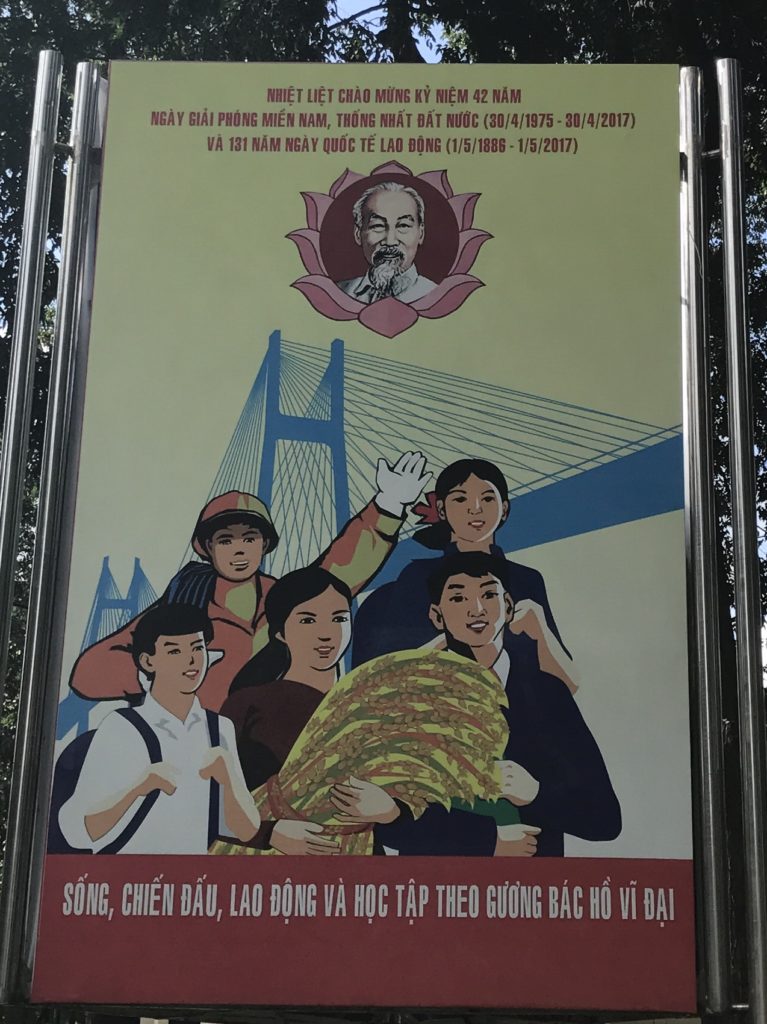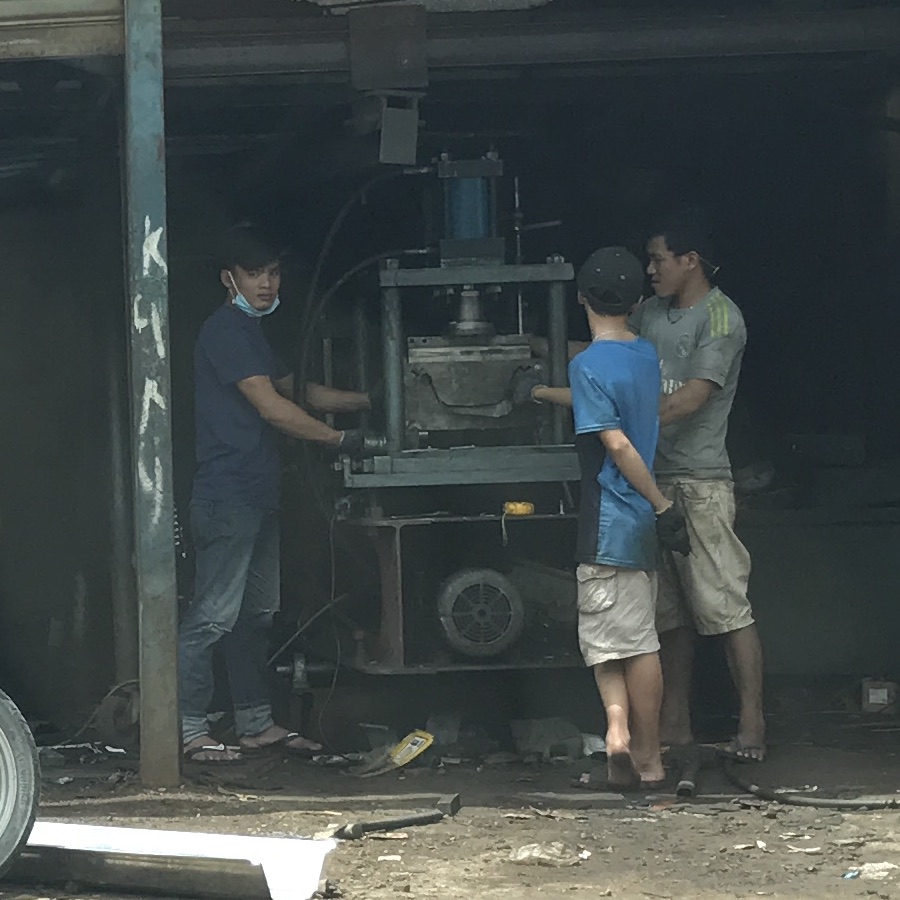Don’t worry
He’s on the “right” side of the window.

He’s on the “right” side of the window.


Extra nerd points if you can remember the character’s real name. Need a hint? Initials R.H.
When I worked in China, the local staff called me “professor.” Part of the reason for the nickname was because of my former job in academia. But another factor could have been that “professor” in Chinese is a lot easier to pronounce than my last name in English. But anyway. I didn’t mind the nickname, it was a nice throwback my former career, and besides, it’s a sign of respect.
Last week, the local staff here in Vietnam told me that they have a nickname for me. I never told them about my former career in academia. So it was surprising (but not really) when they told me they have been referring to me as “professor.”
I guess if I have to remind people of something, there are a lot worse things to remind them of. As nicknames go, “professor” isn’t too bad. I would have preferred “Fabio,” but you can’t choose your own nickname. Oh, well.
Thanks to M.T. for spotting this one!

Anti Social Social Club

This yearis spring and summer
Don’it feel the same

I have been in country over a month now, and I am starting to form some initial impressions. Some are pretty obvious. Of course, my understanding is pretty superficial right now. As I get more familiar with the language and culture, I’m sure I’ll develop some more informed opinions as time goes on.
1. Vietnam is not China
Of course, I knew that all along, intellectually at least. But it’s hard not to compare your current post with your previous post. I spent two years in China. A lot of my initial impressions have been colored by my experiences in Northeast China. In addition, there are some similarities. Vietnamese culture and history cannot escape the influence of over 1,000 years of cultural domination by China. The Vietnamese language has an enormous number of loanwords from Chinese, for example. On a very superficial level, the Vietnamese people eat with chopsticks. So it’s tempting to see Vietnam as a subset of China. But that thinking would be very misleading. The Vietnamese people have been able to maintain very distinct cultural traditions of their own. I could go on and on about the differences between China and Vietnam, but long story short, Vietnam is a very distinct place, not China at all.
2. Communism’s Thumbprint is Obvious

Hagiographic posters like this are everywhere in the country. They promote official doctrine about political and social values. This one encourages people to follow the example of “the great Uncle Ho” (Ho Chi Minh).
I think this is one of the factors that misled me to see more similarities between China and Vietnam. Both countries have a communist government, and the governments in both countries have adopted a similar economic policy. The local economy is allowed to operate as a market economy (just please don’t call it “capitalism.” That’s a dirty word in communist countries). Although there are a lot of freedoms here, the government keeps very (VERY) firm control over politics and the press. Just like in China. There is a very clear line where economic freedoms end and government control begins. A Chinese taxi driver put it this way to me many years ago: you have freedom from the neck down. That seems to be the case in Vietnam, too.
3. War? What war?
The Vietnam War (or as they call it here: the American War) is ancient history. Unlike many Americans, the Vietnamese people don’t seem to obsess over it. I think there are two reasons for that. One is that on the average, Vietnamese people are too young to remember the war. It all happened before they were born, so the whole event is an abstract idea. The other reason that they don’t dwell on the war (and this is just my opinion) is because they won. In comparison, we Americans don’t spend time re-hashing the Spanish-American war, although the effects of the war influenced global events. Why? Because it could be argued that we won that war. Things went well for us afterwards, and America gained significant advantages from that war. For the Vietnamese, the end of the “American War” war meant that they could stop fighting for independence (after 25+ years), and move forward to building their country. The war is part of their history, of course, and we see many military artifacts all over the city as a reminder of the war. But psychologically, it seems, they have moved on.
4. Huge gap between the haves and the have-nots
I live in an upscale part of the city. There are lots of shopping centers, international restaurants, and well-educated people here. But you go just a kilometer in any direction from my apartment, and you can see people really struggling. There is also some crushing poverty here. You can see the same phenomenon in any country, of course. Even in America, there are some areas that seem to have been missed out on the American Dream. I have to remind myself that I live in a bubble here, and most of the people that I come into contact with here are not the 1%.

Machine shop in the outskirts of Ho Chi Minh City. Note the lousy lighting and lack of steel-toed boots and safety glasses. OSHA would not like this.
5. America is Popular
I’m interviewing a lot of students who want to study in America because they think that an American education is the key to their success in Vietnam. Many Vietnamese people have a high regard for the U.S. There are some political and strategic reasons why the Vietnamese government would want close relations with the U.S. (mainly to counter the growing influence of China in the region). But on the individual level, many Vietnamese people seem to like Americans. Many times, I have walked down the street (especially in poorer areas), and Vietnamese people smile and greet me. I’ve been greeted with “America, good!,” accompanied by a thumbs-up gesture, from many people here. I’d like to think that a lot of this good will is due to our successful public diplomacy work here. We spend a lot of effort on our “soft power” relationship with Vietnam. But that can’t account for all of the positive impression of America in the minds of the Vietnamese people. You can’t transplant a positive attitude toward a country into the hearts and minds of people. A good reputation has to be earned. I think that in Vietnam, the U.S. still enjoy a reputation as a country that, for all its faults, has had a positive impact on the world, and at least tries to treat other countries fairly.
I’ve only scratched the surface. I still have two years to discover this country, and I plan to take advantage of every opportunity to learn. One of the perks of my job is having the time to get to know a country in depth. The more time I spend outside America, the more I appreciate America. The patriot part of me will love my country forever. The student-scholar part of me loves the chance to be a livelong learner. This has been a great experience so far.